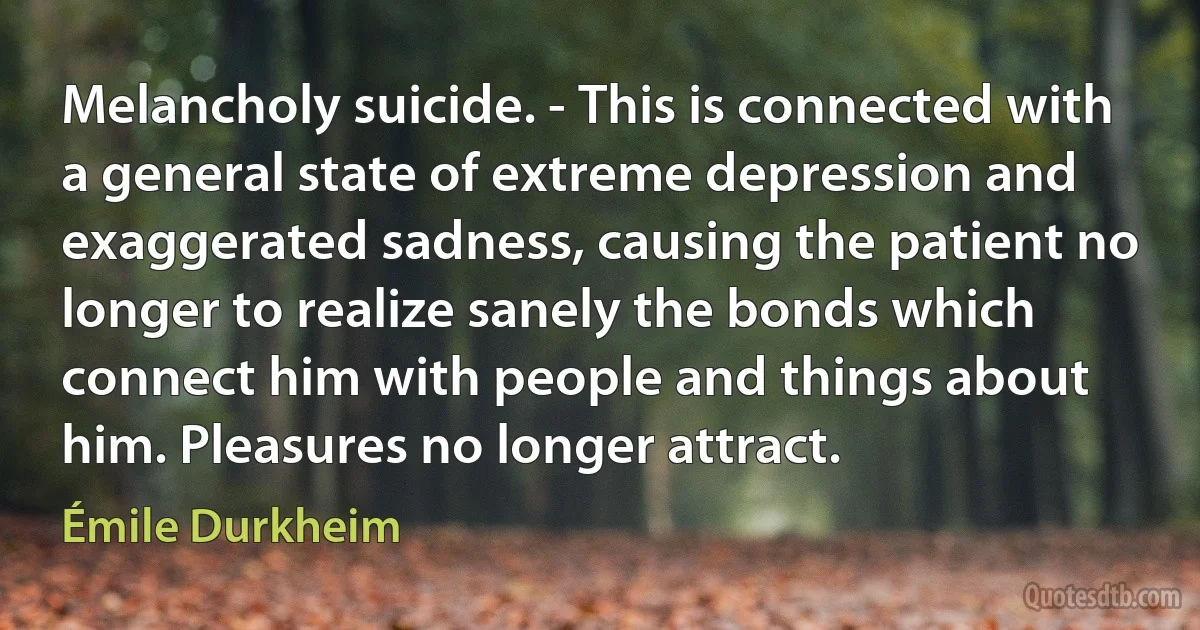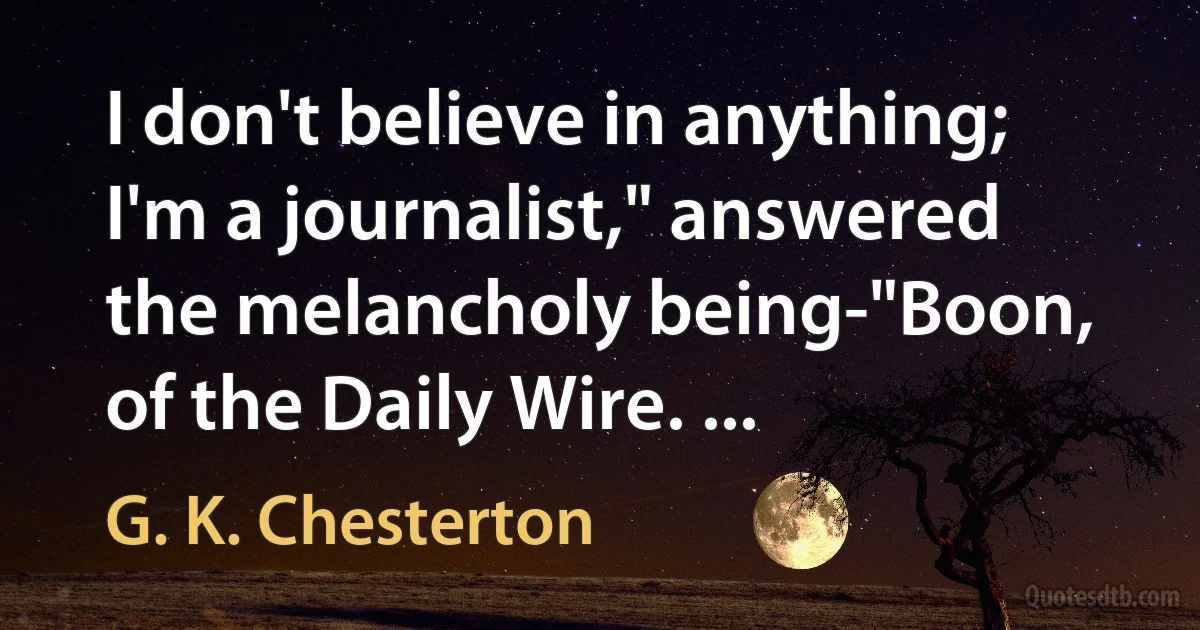Melancholy Quotes - page 5
But a morbid consciousness that others did not give him the place which he had not demonstrably merited-a perpetual suspicious conjecture that the views entertained of him were not to his advantage- a melancholy absence of passion in his efforts at achievement, and a passionate resistance to the confession that he had achieved nothing.

George Eliot
My heart is broken by the terrible loss I have sustained in my old friends and companions and my poor soldiers. Believe me, nothing except a battle lost can be half so melancholy as a battle won: the bravery of my troops hitherto saved me from the greater evil; but to win such a battle as this of Waterloo, at the expense of so many gallant friends, could only be termed a heavy misfortune but for the result to the public.

Arthur Wellesley, 1st Duke of Wellington
Our more serious devastation was invisible-the shattering of our export trade through our being cut off for over four years from our normal overseas markets. We were the largest international traders in the world and were, therefore, more vulnerable in this respect than any other country. Our customers had been driven either to secure their supplies from rival sources or to start manufacturing for themselves. Indeed, our export trade has never recovered from the War, as the derelict factories of our industrial districts bear melancholy witness. While world trade had by 1927 risen to 120 per cent of the pre-war level, British export trade was only 83 per cent of its pre-war height. That is our real devastated area.

David Lloyd George
He who carries self-regard far enough to keep himself in good health and high spirits, in the first place thereby becomes an immediate source of happiness to those around, and in the second place maintains the ability to increase their happiness by altruistic actions. But one whose bodily vigour and mental health are undermined by self-sacrifice carried too far, in the first place becomes to those around a cause of depression, and in the second place renders himself incapable, or less capable, of actively furthering their welfare. In estimating conduct we must remember that there are those who by their joyousness beget joy in others, and that there are those who by their melancholy cast a gloom on every circle they enter.

Herbert Spencer
It is a greatness not of mere body and gigantic bulk, but a rude greatness of soul. There is a sublime uncomplaining melancholy traceable in these old hearts. A great free glance into the very deeps of thought. They seem to have seen, these brave old Northmen, what Meditation has taught all men in all ages, That this world is after all but a show,-a phenomenon or appearance, no real thing. All deep souls see into that,-the Hindoo Mythologist, the German Philosopher,-the Shakspeare, the earnest Thinker, wherever he may be.

Thomas Carlyle
The melancholy science from which I make this offering to my friend relates to a region that from time immemorial was regarded as the true field of philosophy, but which, since the latter's conversion into method, has lapsed into intellectual neglect, sententious whimsy and finally oblivion: the teaching of the good life. What the philosophers once knew as life has become the sphere of private existence and now of mere consumption, dragged along as an appendage of the process of material production, without autonomy or substance of its own.

Theodor Adorno
You will often hear that Dada is a state of mind. You may be gay, sad, afflicted, joyous, melancholy or Dada. Without being literary, you can be romantic, you can be dreamy, weary, eccentric, a businessman, skinny, transfigured, vain, amiable or Dada... Dada is here, there and a little everywhere, such as it is, with its faults, with its personal differences and distinctions which it accepts and views with indifference.

Tristan Tzara
A human face, a hand, a woman's breast or a manly body, an expression of conflicting joy and pain, the infinite ocean, savage crags, the melancholy speech of black trees against the snow, the fierce power of spring blossoms and the heavy lethargy of a hot summer noon when our old friend Pan is asleep and the ghost of noon are murmuring – all this is enough to make us forget the sorrows of the world, or to give them form. In any case the determination to give form to things brings with it part of the solution for which you are seeking. The path is hard and the goal can never be reached – but it is a path.

Max Beckmann
Gentlemen, the melancholy event of yesterday reads to us an awful lesson against being too much troubled about any of the objects of ordinary ambition. The worthy gentleman, who has been snatched from us at the moment of the election, and in the middle of contest, whilst his desires were as warm, and his hopes as eager as ours, has feelingly told us, what shadows we are, and what shadows we pursue.

Edmund Burke
To-day Europe is neither at war nor at peace, but stands at armed attention...That, in itself, is a sufficiently melancholy, devastating reply to all the efforts of the lovers of peace. But what is much worse is this: peace in some quarters is proclaimed as a bad dream, and war sanctified as an ideal for rational men. As long as the British Empire lasts we will raise our voices against these false gods.

Stanley Baldwin
And the color, the overcast blue
Of the air, in which the blue guitar
Is a form, described but difficult,
And I am merely a shadow hunched
Above the arrowy, still string,
The maker of a thing yet to be made;
The color like a thought that grows
Out of a mood, the tragic robe
Of the actor, half his gesture, half
His speech, the dress of his meaning, silk
Sodden with his melancholy words,
The weather of his stage, himself.

Wallace Stevens
During the whole of a dull, dark, and soundless day in the autumn of the year, when the clouds hung oppressively low in the heavens, I had been passing alone, on horseback, through a singularly dreary tract of country, and at length found myself, as the shades of the evening drew on, within view of the melancholy House of Usher.

Edgar Allan Poe
Perhaps the editor may be accused of nationality, when he says, that, taking the total merits of this work together, he prefers it to the early exertions of even the Italian muse, to the melancholy sublimity of Dante, and the amorous quaintness of Petrarca...Here indeed the reader will find few of the graces of fine poetry, little of the attic dress of the muse; but here are life and spirit, and ease and plain sense, and pictures of real manners, and perpetual incident and entertainment. The language is remarkably good for the time, and far superior in neatness and elegance even to that of Gawin Douglass, who wrote more than a century after.

John Barbour
Prayer is the force as real as terrestrial gravity. As a physician, I have seen men, after all other therapy had failed, lifted out of disease and melancholy by the serene effort of prayer. Only in prayer do we achieve that complete and harmonious assembly of body, mind and spirit which gives the frail human reed its unshakable strength.

Alexis Carrel



